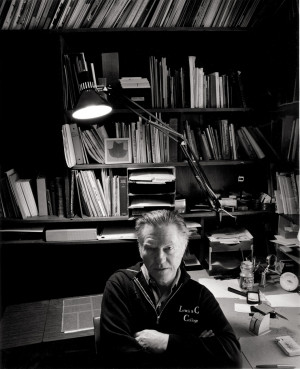In his biography of the poet Georges Perros, Jean-Marie
Gibbal quotes a student from Rennes where Perros taught:
He would come in on Tuesday morning, wind-whipped and frozen
stiff on his rusty blue motorcycle. Hunched over in his pea-coat, his pipe in
his mouth or in his hand. He would
empty a bag of books onto the table.
And life would begin.
Fifteen years later, that student is still under Perros’
spell. Smiling as she recalls the
memory over a cup of coffee, she travels through time to her own recollections.
“That was how life began” a half-ton of books, pipes,
tobacco, a copy of France-Soir or L’Equipe, keys, notebooks, bills, a sparkplug
from his motorcycle … And out of that mess he drew a book, cast his eyes upon
us, gave us a laugh that let us know something good was coming, then began to
read. He paced as he read, one
hand in his pocket, the other one holding the book, outstretched, as if he were
literally giving us a gift. All
his reading was a gift. He asked
nothing ion return. When one of us
began to drift off, he stopped reading in a second, eyes on the daydreamer, as
he whistled a little tune. The
object was not to upbraid, but to invite the person to return to his world. He never lost sight of us. Even when most absorbed in his reading,
he looked at us from over the lines.
His voice was deep yet luminous, and slightly hushed. It filled the classroom, as it would
have filled an amphitheater, or Notre-Dame cathedral, without him having to
pronounce one word louder than the other.
Instinctively, he measured the space around him and the space in our
minds. He was the natural echo
chamber of every book, the incarnation of the text, the book made flesh. Through his voice, we discovered that
every book had been written for us.
The discovery was a revelation after the long years of schooling and the
literature classes that kept us at a respectable distance from books. What did he do more than our other
professors? Nothing. In some ways he did less. The
difference was this: he didn’t deliver literature with the medicine-dropper of
analysis; instead, he filled the glass to the brim. We understood what he read to us. We got inside it.
There could be no more brilliant explanation of the text than the sound
of his voice as he anticipated an author’s intention, revealed a hidden
meaning, uncovered an allusion. He
made misunderstanding impossible.
It would have been absolutely unthinkable, after hearing him read
Marivaux’s Infidelities, to mistake the true meaning of the bedroom farce and misinterpret
this theater of dissection as light entertainment. The precision of his voice transformed the classroom into a
laboratory; the lucidity of his speech urged us to pick up our scalpels and get
to work on the living specimen.
Not that he added what wasn’t there, not that he drew us into the
waiting room of Dr. Sade. Still,
as we listened to him, we couldn’t help seeing the cross-sections of the brains
of Arlequin and de Silvia, those Marivaux characters, as if we ourselves were
presiding over the vivisection of these two beings.
“We had him an hour a week. That hour was like his backpack: anything could jump
out. When he left us at the year’s
end, I counted up mu acquisitions.
Shakespeare, Proust, Kafka, Vialatte, Strindberg, Kierkegaard, Moliere,
Beckett, Marivaux, Paul Valery, Huysmans, Rilke, Georges Bataille, Julien
Gracq, Hardellet, Cervantes, Laclos, Cioran, Checkov, Henri Thomas, Michel
Butor … I’m remembering as many as I can but I know I’ve forgotten half of
them. In ten years, I haven’t heard the tenth of them!
“He talked freely, he read freely, he didn’t assume we had a
library in our heads. There wasn’t
a crumb of bad faith in the man.
He took us for what we were: young, ignorant students who deserved to
know more. There was no talk about
cultural heritage or sacred secrets that inhabited the ether. With him, books didn’t fall from the
sky like manna; he simply picked them up off the ground and offered them to us
to read. Everything was present;
we were surrounded by the rippling of life. I remember our disappointment at the beginning, when he
presented the masters whom our teachers had already told us about: Moliere, La
Fontaine. But within an hour, they
had lost their status as academic divinities; they became friends without ever
losing their mystery. We simply
couldn’t live without them. Perros
resurrected authors. Arise and go forth.
From Appolinaire to Zola, from Brecht to Wilde, they strode into the
classroom, very much alive, as if they’d just been at the café across the
street. A café where sometimes
he’d take us for a second intermission.
He didn’t play the buddy-buddy professor, that wasn’t his type. It was simply his way of teaching what
he called his ‘course in ignorance.’
With him, culture stopped being a state religion, and the bar was a
rostrum as proper as any lectern the school had to offer. We listened to him, but we felt no
desire to join his order or to put on the clerical collar of knowledge. We just wanted to read. When the class was over, we cleaned out
all the bookstores in the county.
The more we read, he warned, the more ignorant we would feel, alone on
the shore of our ignorance, facing the sea. With him, we weren’t afraid to get our feet wet. We dove into books and wasted no time
splashing around fearfully in shallow water. I don’t know how many of us became teachers. Not many, no doubt, and that’s too bad,
because he instilled in us the desire to share. To share with the four winds. He couldn’t care less about teaching; his ideal was an
itinerant university.
“Why don’t we go out for a walk? Let’s drop in on Goethe in Weimar, and cuss out God with
Kierkegaard’s father. The we can
see what the white nights are like on Nevsky Prospect …”
“Reading, the resurrection of Lazarus, rolling away the
stone of words.” - Georges
Perros
That teacher wasn’t just inculcating a body of knowledge; he
was giving us what he knew. He was
less professor, more master troubadour: one of those word-jugglers who haunted
the hostelries on the road to Compostela and sang chronicles of the heroes to
the illiterate pilgrims.
Since everything has to start somewhere, each year he would
gather his little flock at the source of the novel. Like that of the troubadours, his audience did not yet know
how to read. He opened their
eyes. He turned on the lights. He
set his students on the road to books, on a pilgrimage without end, a path of
encounters.
“He read out loud – that’s what made the difference. Right from the start, he trusted our
desire to understand … A teacher who reads out loud lifts you to the level of
books. He gives you the gift of
reading!”



















































































































































































